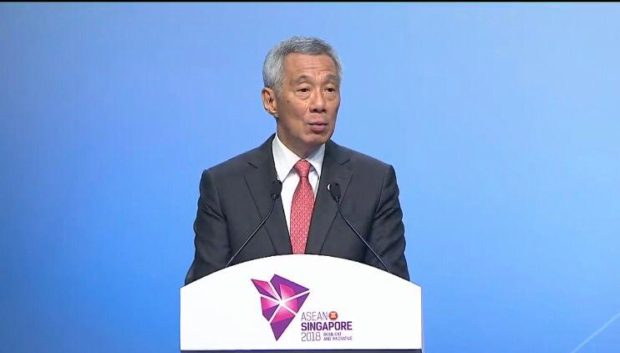
Singapore Prime Minister Lee Shien Long calls on members states of the Association of Southeast Asian Nations (Asean) to boost multilateral cooperation in addressing “new challeges” in the region on November 13, 2018. INQUIRER.net FILE PHOTO
SINGAPORE — As countries in the region make progress on Covid-19 vaccination, it is timely that Asean and China should work on progressively reopening borders to one another, said Prime Minister Lee Hsien Loong on Monday (Nov 22).
This includes developing digital, interoperable and secure solutions to facilitate the mutual recognition of vaccination certificates.
Speaking at the Asean-China Special Summit, PM Lee also welcomed Asean’s move to formally upgrade relations with China to a comprehensive strategic partnership. This means both sides will cooperate at a deeper level across various areas.
“I am confident that it will be a meaningful, substantive and mutually beneficial upgrading,” he said.
He said countries should also look to enhance the Asean-China Free Trade Agreement, as well as the Asean-China Air Transport Agreement to support civil aviation and tourism.
The virtual summit with Chinese President Xi Jinping is being held to commemorate the 30th anniversary of Asean-China dialogue relations.
During the one-day event, leaders took stock of the relationship and discussed ways to further strengthen ties. They also exchanged views on regional and international developments.
PM Lee noted that both sides have continued to strengthen their partnership despite the pandemic, with Asean becoming China’s top trading partner last year. The annual trade between both sides now exceeds US$500 billion (S$681 billion).
And even as protectionism grows, Asean and China are leading the way on trade liberalisation with the Regional Comprehensive Economic Partnership (RCEP) trade pact, which takes effect on Jan 1.
Signed in November last year, the RCEP is a mega trade deal between the 10 Asean member states, as well as China, Australia, Japan, New Zealand and South Korea.
Asean and China are also regularly exchanging information to combat the coronavirus, with China contributing to the Covid-19 Asean Response Fund.
And both sides have issued joint statements on cooperation under the Asean Comprehensive Recovery Framework, as well as on Enhancing Green and Sustainable Development Cooperation, which will support the region’s recovery from the pandemic and deepen cooperation on sustainable development.
In his speech, PM Lee emphasised that Asean and China should continue working together for peace and stability in the region – including managing tensions in the South China Sea.
Singapore’s position, as a non-claimant state and small nation dependent on trade, has not changed, he added.
Negotiations on a code of conduct for the South China Sea have been progressing despite difficulties with holding physical meetings, and Singapore will continue to work with all parties towards an “effective and substantive” code that is in accordance with universally recognised principles of international law.
The relationship between China and the United States is also another factor in regional peace and prosperity, PM Lee said.
He welcomed the recent high-level exchanges between both countries, including the virtual meeting between President Xi and his American counterpart Joe Biden last week.
Both leaders’ statements that they are willing to work together to deepen cooperation and prevent conflict are encouraging, PM Lee said.
“Countries in the region want good relations with both US and China, and do not wish to have to choose sides,” he added. “We hope that China and the US will work out a modus vivendi that will enable cooperation in areas of common interest, such as climate change and free trade.”
Asean-led platforms can also help foster constructive dialogue, trust and cooperation between key players in the region, the Prime Minister noted.
But doing so requires the “steadfast support” of Asean’s partners – including China – to reinforce Asean centrality and the 10-member group’s role in the open and inclusive regional architecture.
PM Lee added that he welcomed the fruitful dialogue with China, and looks forward to discussions to unlock new opportunities for partnership at annual Asean-China meetings.
Myanmar’s military chief Min Aung Hlaing did not attend the summit on Monday.
Asean leaders have maintained that Myanmar should be represented by a non-political figure even though China has lobbied for the general to attend.
The Straits Times has reached out to Myanmar’s junta for comment.
Last month, Brunei, as this year’s Asean chair, effectively barred the Myanmar junta chief from an Asean leaders’ summit from Oct 26 to 28 by extending an invitation to a “non-political representative” from Myanmar after an emergency foreign ministers meeting on Oct 15.
This was in response to the junta’s stonewalling of attempts to foster domestic dialogue amid Myanmar’s political crisis.
The country is now trapped in escalating violence amid broad resistance to the Feb 1 military coup that overthrew a civil government led by the National League for Democracy.
Myanmar refused to send a non-political representative to the leaders’ summit in protest against General Min Aung Hlaing’s exclusion. The junta said the exclusion was a breach of Asean’s code of consensus and non-interference.